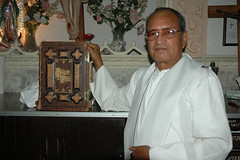Perimeter of Freedom of Speech
Zahidul Islam Biswas
Recently the Bombay High Court has made a significant ruling on freedom of speech while upholding a ban issued in 2007 by the Maharashtra government on a book titled `Islam – A Concept of Political World Invasion by Muslims.’
A three-judge bench of the Bombay high court held that in India, criticism of any religion — be it Islam, Hinduism, Christianity or any other — is permissible under the fundamental right to freedom of speech and that a book cannot be banned on those grounds alone. However, the criticism must be bona fide or academic. But the book contained an ‘aggravated form of criticism made with a malicious and deliberate intention’ to outrage the feelings of Muslims.
In the landmark verdict, the court upheld the state’s ban on the book, and said that, ‘in our country, everything is open to criticism and religion is no exception. Freedom of expression covers criticism of religion and no person can be sensitive about it.’
The bench, comprising Justices Ranjana Desai, D Y Chandrachud and R S Mohite, said, ‘Healthy criticism provokes thought, encourages debate and helps us evolve. But criticism cannot be malicious and must not lead to creating ill-will between different communities… (it) must lead to sensible dialogue.’ The 150-page HC verdict penned by Justice Desai observed that the courts must strike a balance between the guaranteed freedom and permissible restrictions, which is ‘a difficult task’.
The book, authored by R V Bhasin, a Mumbai-based advocate, in 2003 had been in circulation for four years before the state felt the need to ban it for ‘several derogatory and false statements about Muslim religion, the community, Mohammed Paigambar and Muslim priests’.
R. V. Bhasin challenged the ban the same year and his counsel J P Cama argued at length that freedom of speech and expression has to be protected and unless a book gives rise immediately to a present and sudden danger of disrupting communal or societal peace, its ban cannot be justified. He said the author placed certain lesser-known aspects about Islam before the people and said, ‘Assuming he is wrong, he has a right to be wrong.’
But the state’s ban was supported as justified by advocate general Ravi Kadam and later on by Yusuf Muchala, the counsel for a few intervenors, including Indian Union Muslim League, Maharashtra Muslim Lawyers Forum, Islamic Research Foundation, Jamat-e-Islami-e-Hind and Bombay Aman Committee. There was one intervenor, I G Khandelwal, from Right to Read Foundation, to support the author.
The bench had reserved the matter for judgment last August (2009) after a lengthy hearing. The court said, ‘The author can say what he feels is right and if it is wrong, he cannot be punished for it. But what needs to be seen is whether it was done bona fide with real desire to explore the tenets of Islam and give his exposition’.
In this case, the court held that the criticism of Islam and ‘insulting comments with particular reference to Indian Muslims’ were ‘not academic’. ‘It is an aggravated form of criticism made with a malicious and deliberate intention to outrage the religious feelings of Muslims. The contents are so interwoven that it is not possible to excise certain portions and permit circulation of the book,’ the court said. It is to be mentioned that the author had declined an earlier suggestion to delete certain parts.
While, in the judgment, the high court said that a person may have a right to say a particular religion is ‘not secular’, it cautioned against rabid contents ‘reeking of hatred for a particular community’ and ‘malafide exercise to stir communal passions’. The court also found the author’s argument that banning the book in the age of the internet is passe and pointless as ‘totally unacceptable’.
According to the judgment, the book contains ‘highly objectionable and disturbing’ statements about the author’s wishful thinking of an impending war between Muslims and others and how Indian Muslims want to convert all Hindus, attack temples and Hindu women. Statements like these are ‘likely to incite people to violence and may promote violence, enmity or hatred’.
After this verdict, the author of the book Mr. Bhasin told the Times of India, leading English daily, that he would go to the Supreme Court in appeal. He said that ‘Freedom of speech cannot be blocked on interpretation.’
However, the judgment has brought a sigh of relief to civil right activists committed to the communal peace and harmony in India. They believe that the judgment, if appeal against, will be upheld in the Supreme Court also.
The author is an advocate of the Supreme Court of Bangladesh, currently at the Centre for the Study of Law and Governance, Jawaharlal Nehru University, New Delhi. The write-up is based on a Times of India report by Swati Deshpande.
Citation: Zahidul Islam Biswas, ‘Law & Our Rights’, The Daily Star, Issue No. 152 (2010), January 16, 2010.
The Author is an advocate of the Supreme Court of Bangladesh.He specialises on rural justice and family laws in Bangladesh.
Article from articlesbase.com


